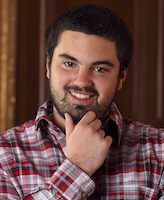
Pride in his cultural heritage and a love of literature prompted senior English major Matthew Coyne to delve into the origins of the Appalachian literary journal Cold Mountain Review last summer—a research project he then expanded into a senior thesis on influential regional writers.
“My professors encouraged me to study what I love,” says Coyne, who was raised in Parkersburg, W.Va., a small town located in the heart of Appalachia. “So I did, and I haven’t looked back since.”
Coyne says his roots in the region inspire him to focus on “what I consider to be important questions about how residents of Appalachia relate to the region, how they shape their identities, and what that means for the future of the area.”
Chronicling a Literary Community
Coyne’s initial research took him to Appalachian State University (ASU) in Boone, N.C., where three students founded Cold Mountain Review in the early 1970s. The trip was funded by an Undergraduate Research Opportunity Program (UROP) grant from Notre Dame’s Institute for Scholarship in the Liberal Arts.
Although each of Cold Mountain Review’s founding authors has received some academic attention, the influence they had on each other and literary society has never been adequately investigated, says Coyne.
“It was an exciting experience to know my work was filling in a gap in the field of Appalachian literary studies, a subject that means so much to me,” he says.
After weeks of work in ASU’s archives, Coyne conducted an extensive interview with two of the Cold Mountain Review founders. To help future scholars, he then donated his recordings and more than 40 pages of transcripts to the W.L. Eury Appalachian Collection archives at ASU’s Carol G. Belk Library. Coyne also created an edited version of his interview, which he submitted to Appalachian Journal, a multidisciplinary, peer-reviewed journal published at ASU.
“I learned a lot about the relationship between higher education and literary production in the Appalachian south,” he says. “I also was very interested to find that the literary community in Appalachian State’s graduate school in the 1970s more closely resembled the community of the Fugitive poets at Vanderbilt in the 1920s than it did the emerging culture of creative writing programs springing up across the country.”
Researching Regional Authors
Coyne says his experience at ASU was the basis for his senior thesis on West Virginia short story writer Breece D’J Pancake, who “shares many similarities” with the founders of Cold Mountain Review. He attributes a great deal of the smooth and successful progression of his thesis on the “invaluable preparation” his summer UROP project afforded him.
“It has been a huge help … in better familiarizing me with the region in general and with the region’s complexities, literary history, and contemporary literature,” Coyne says. “My work with the Appalachian Journal has also been useful in that it continues to be one of my most important critical resources.”
Kate Marshall, an assistant professor in the Department of English, serves as Coyne’s senior thesis and summer research adviser.
“His work at the Appalachian State archives and the author interviews he conducted while in residence put him in contact with materials and thinkers that have helped shape his current work,” Marshall says. “It gave him access to a mode of literary scholarship that undergraduates rarely have a chance to encounter with such thoroughness.”
She says Coyne’s senior thesis builds on that foundation. “His research on American regional authors Breece D’J Pancake and Willa Cather in relation to critical conversations on the idea of ‘deep time’ in literature is fascinating, sophisticated, and original,” Marshall says. “Matt has already been preparing his work for publication and conference venues, and it’s exciting to work with him on developing a project with this larger scope.”
Next year, Coyne will start a job as a technical writer for a software company and hopes to, one day, pursue a career in publishing.
“But regardless of what I end up doing and where I end up doing it, I am committed to encouraging conversation in and about Appalachia,” Coyne says. “I hope my research will contribute to this purpose.”
Learn More >
- Institute for Scholarship in the Liberal Arts
- Kate Marshall faculty page
- Cold Mountain Review
- Appalachian State University